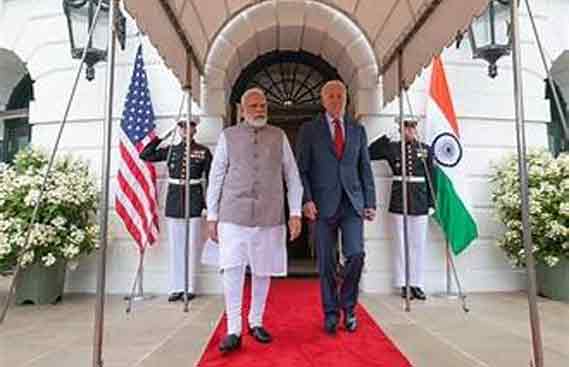India Achieves Bilateral Resolution of All Seven WTO Disputes

India and the US aim to enhance their economic ties, exploring trade opportunities together. They seek sustainable growth for citizens and global financial stability through trust and cooperation.
India and the United States have jointly communicated to the World Trade Organization (WTO) their mutually agreed resolution regarding a longstanding dispute over poultry imports from the US. This marks the conclusion of all seven pending trade disputes between the two nations within the global trade body.
The resolution signifies the bolstering of economic relations between India and the US and underscores India's evolved approach to trade matters. The US is India’s largest trading partner, with bilateral goods trade escalating to $ 119.5 billion in the preceding year.
The settlement announcement transpired following discussions between Prime Minister Narendra Modi and US President Joe Biden during the G20 summit. As part of the settlement terms, India agreed to reduce import duties to 5-10 percent on specific fresh and processed food items, including cranberries, blueberries, and frozen turkey.
Efforts to resolve bilateral WTO disputes commenced during the annual Trade Policy Forum (TPF) meeting, which addressed trade and investment concerns between India and the US. Commerce and Industry Minister Piyush Goyal emphasized the need for proactive engagement in resolving disputes, acknowledging that these areas witnessed both victories and setbacks for both nations.
Both countries decided to close six outstanding WTO disputes, including India's challenge against US tariffs on steel and aluminum imports and the US's objection to India's retaliatory tariffs. The disputes involved India's subsidies for solar cells as part of the Jawaharlal Nehru National Solar Mission and similar subsidies provided by eight US state governments. Additionally, the US resisted India's export subsidy initiatives and imposed countervailing duties on certain hot-rolled carbon steel flat products from the US.
Resolving these disputes underscores the diplomatic efforts undertaken by both nations to address trade grievances and foster a conducive environment for bilateral trade and investment. These developments reflect India's commitment to abiding by international trade norms and regulations while safeguarding its national interests.
The successful resolution of these disputes paves the way for enhanced collaboration between India and the US across various sectors, facilitating greater economic cooperation and the exchange of goods and services. Furthermore, it reinforces the significance of dialogue and negotiation in addressing trade disagreements and underscores the benefits of a rules-based international trading system.
India and the US are poised to capitalize on this positive momentum to strengthen their economic partnership further and explore mutually beneficial trade initiatives. By fostering an environment of trust and cooperation, both countries leverage their strengths to drive sustainable growth and prosperity for their citizens and contribute to global economic stability.

.jpg)

